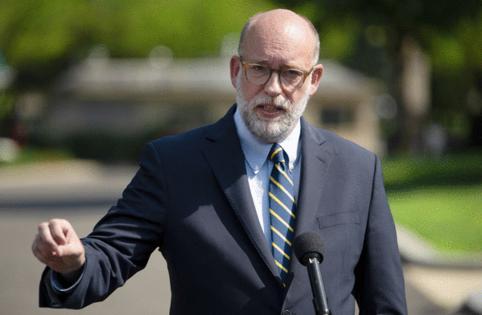House sends $9 billion rescissions package to president's desk
Published in News & Features
WASHINGTON — The House early Friday narrowly cleared a package to cancel $9 billion in federal spending, the first time in decades lawmakers have agreed to a White House request to claw back funding previously approved by Congress.
The action marks a significant victory for the Trump administration and paves the way for future spending cancellations to be sent to Congress.
The vote, 216-213, would effectively cancel $7.9 billion in foreign aid funding and $1.1 billion in taxpayer support for the Corporation for Public Broadcasting, which provides grants to NPR and PBS. The package was a high priority for the Trump administration and would effectively codify cuts made by the Department of Government Efficiency, known as DOGE.
Lawmakers voted to adopt a rule that “deemed” the Senate-amended bill as having cleared the House, bypassing any need for further recorded votes. That maneuver sent the rescissions bill to President Donald Trump’s desk, where he is expected to sign it quickly.
In the past, leaders of both parties have used the strategy as a way to avoid direct votes on politically contentious issues, such as raising the debt limit.
The last time Congress tried to pass a White House rescissions package was during Trump’s first administration in 2018, when their efforts were derailed in the Senate by a surprise “no” vote from then-Sen. Richard M. Burr. The North Carolina Republican was displeased at the time with proposed cuts to the Land and Water Conservation Fund.
This time, a small minority of Republican lawmakers — Brian Fitzpatrick of Pennsylvania and Michael R. Turner of Ohio — joined with all Democrats in the House to vote against the spending clawbacks, but GOP leaders managed to cobble together enough votes to bring the measure across the legislative finish line.
Congress cleared the package the day of the 45-day statutory deadline set out by the 1974 impoundment control law.
Still, the process in the House was not seamless. Floor action on the measure faced an hourslong delay Thursday as Republicans on the Rules Committee grappled with pressure from Democrats on a measure to provide for the release of Justice Department files on convicted sex-offender Jeffrey Epstein.
Democrats on the Rules panel have taken to forcing votes during recent markups in an effort to compel the release of information related to Epstein. Republicans sought to tamp down the issue by backing a resolution calling on the Justice Department to release the files. Shortly before GOP leaders secured the necessary support to move the resolution to the floor, Trump in a Truth Social post announced he would direct Attorney General Pamela Bondi to release relevant grand jury testimony.
Opponents of the rescissions package, including Democrats as well as a few moderate Republicans like Sens. Susan Collins of Maine and Lisa Murkowski of Alaska, have lambasted the White House for not providing details on which specific foreign aid programs will lose funding from the spending clawbacks.
They also warned that the annual appropriations process would be damaged if a precedent is set that bipartisan spending agreements, which typically require 60 votes to pass in the Senate, can be canceled whenever one party has unified control of the White House and the Congress.
White House Office of Management and Budget Director Russ Vought told reporters on Thursday he was pleased with how the rescissions process had gone and urged Republicans to get comfortable with an appropriations process that is less bipartisan going forward.
“Our enthusiasm, the president’s enthusiasm to send additional packages . . . I think it’s likely you’ll see an additional package,” Vought told reporters at the White House on Thursday.
Democrats have also criticized the rescissions as “cruel” for cutting billions of dollars in humanitarian and development assistance at a time of spiraling global need and for cutting access to public television and radio programming, which is expected to disproportionately impact rural communities.
“This is not an America First bill, it’s a China First bill because of the void that’s being created all across the world,” House Minority Leader Hakeem Jeffries, D-N.Y., said during a late Thursday floor speech condemning the measure.
House action came less than 24 hours after the Senate early Thursday voted, 51-48, to send the rescissions package back after stripping out a $400 million cut to the President’s Emergency Plan for AIDS Relief (PEPFAR) program and adding language to prevent the remaining cuts from impacting food assistance and some maternal health activities.
Republicans have defended the spending cancellations as fulfilling Trump’s pledge to reduce waste, fraud and abuse in the U.S. government. GOP lawmakers have focused their ire on perceptions of liberal bias in NPR and PBS as well as on a small number of grants that during the Biden administration were used to support causes important to progressives, such as advancing LGBTQ support and responding to climate change.
---------
—Paul M. Krawzak contributed to this report.
---------
©2025 CQ-Roll Call, Inc. Visit at rollcall.com. Distributed by Tribune Content Agency, LLC.







Comments